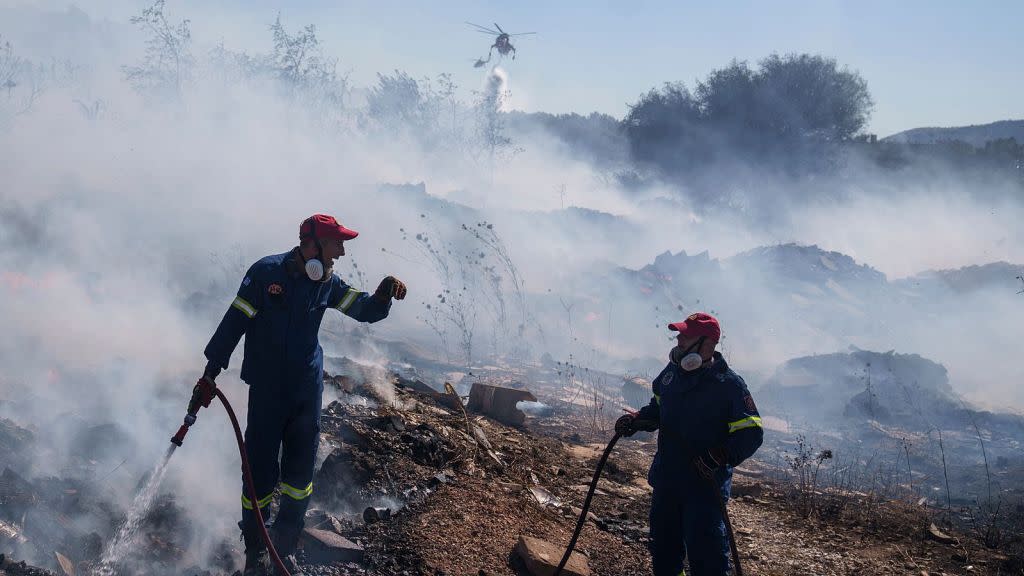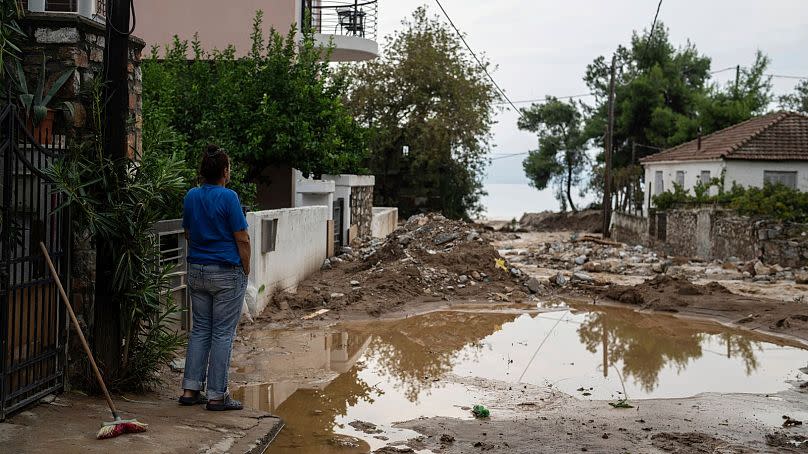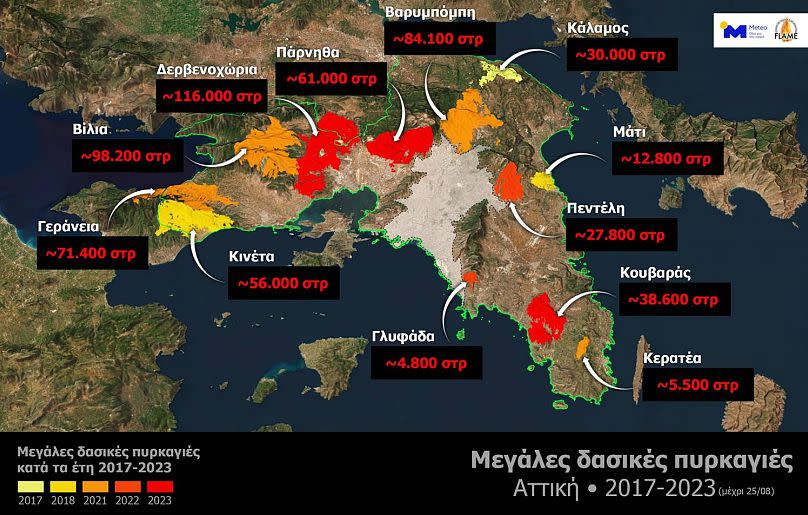Deadly heatwaves in June? Climate scientists explain why extreme weather is battering Greece

Greece’s summer season has got off to a tragic start with its earliest heatwave on record causing several deaths this month.
At least six tourists are known to have died in the searing temperatures, which also shut schools and sites including the Acropolis. One firefighter also lost his life while battling a wildfire last week, as blazes broke out across the country “almost every 10 minutes” according to the fire service.
Temperatures in Athens are currently below the official heatwave threshold of 38C, but little respite is expected for the rest of the summer.
There is no doubt that the Mediterranean country is on the frontlines of human-caused climate change in Europe. Last year, it was scalded by a record long heatwave lasting 16 days, contributing to the EU’s largest ever wildfire as an area twice the size of Athens went up in smoke between July and August. At least 28 people were killed and dozens injured.
Italy braces for 39°C temperatures as heatwave in southern Europe causes mounting safety concerns
Heatwaves do discriminate: This new map shows who is most at risk when hot weather strikes Europe
There was little time for Greeks to catch their breath before deadly floods struck in September, with some areas receiving an average year’s worth of rain in one day from Storm Daniel.
As it braces for another season of veering climate extremes, what are the reasons that Greece is so badly impacted?
The Mediterranean is the fastest heating area in Europe
We know that Europe is the fastest-warming continent in the world, with temperatures here rising at roughly twice the global average. That’s backed up by a recent report from the UN's World Meteorological Organization and the European Union's climate agency, Copernicus.
In summer in particular, the warming is most acute over central and southeastern Europe and around the Mediterranean, Copernicus says.
“The Mediterranean is a hot spot of the climate crisis,” says Dr Lagouvardos, research director at the National Observatory of Athens (NOA). Southern Italy, Cyprus, Türkiye and northern African countries are also badly impacted by the rising heat.
The eastern part of the Mediterranean is heating up particularly fast, he adds. Over the past 30 to 40 years, NOA’s research shows that the overall temperature increase in Greece exceeds 1.5C - a very high jump for such a short passage of time.
Extreme weather events have increased in Greece
To better assess how his country’s climate is changing, Lagouvardos founded and coordinates a network of hundreds of automated surface meteorological stations across Greece.
These help to provide more localised heat warnings, and to track trends in which parts of the country are warming fastest. It is not southern Greece, in fact, but northwestern parts of the country - removed from the sea - that have a higher warming trend over the past 30 years, he says.

NOA is also keeping tabs on extreme weather events - which it classifies as those causing significant social and economic impacts. From 2000 to 2009 there were 60 such events, jumping by 50 per cent to 90 between 2010 and 2019.
Many islands make Greece more vulnerable
Greece is an unusual mosaic of land and sea. It has the longest coastline in the Mediterranean - once you unravel its thousands of islands in the Aegean, Ionian and Mediterranean Seas and the Sea of Crete.
“The existence of many islands amplifies these [climate] vulnerabilities due to their isolation, varied microclimates, and the logistical challenges in managing disasters across a dispersed archipelago,” says Christos Zerefos, secretary general at the Academy of Athens and climate envoy for Greece.
Some islands have limited infrastructure and accessibility, which can hinder evacuation and relief efforts when crisis strikes.
“Taking into account that Greek islands host unique ecosystems and biodiversity that are highly sensitive to changes in temperature and precipitation, climate change, through increased fires and extreme weather, is the most significant threat to these ecosystems,” he adds.
Marine heatwaves are driving medicanes

“We have a system that works altogether - the sea, the air - and as one of the components in this system is warming, then it warms the other,” Dr Lagouvardos explains.
Marine heatwaves have been getting longer, more frequent and more severe over the eastern Mediterranean Sea. Warmer sea surface temperatures in turn provide the energy for fiercer and more frequent storms.
Most dangerously, these warmer waters have been driving more Mediterranean hurricanes or ‘medicanes’: tropical-like cyclones which can unleash severe weather on Greece, as was the case during Storm Daniel last year.
Dry and strong winds create a perfect storm for forest fires
Greece’s proximity to Africa means that warm spells of wind often make their way across the ocean from the Sahara. This happened earlier this month, with hot dust-bearing winds - known as ‘Sirocco’ or ‘Khamsin’ - fuelling the heatwave.
These winds are typically very dry and can desiccate vegetation, making it more prone to being sparked and spreading fires, says Zerefos.
On the flipside are the ‘Etesians’ - strong, dry northern winds which blow over the Aegean Sea, mainly affecting the islands and the eastern parts including Athens. They typically dominate in July and August, but are now getting more frequent in June too.
Although the Etesians can bring residents some relief by lowering temperatures slightly, their strength can exacerbate fire conditions.

“Their strong, persistent nature can fan existing fires, making them harder to control and spreading them more rapidly across the islands and mainland,” Zerefos explains. And, he points out, climate simulation results suggest that climate change might be making them even more intense.
If there is a distinction to be made between Greece and other Mediterranean countries regarding climate impacts, Lagouvardos thinks it is the number of forest fires, which is disproportionately high.
How is Greece tackling forest fires?
Reflecting the country’s frontline position, politicians tend to talk in much stronger terms about the crisis than many of their northern European counterparts.
“Greece is facing a war in a time of peace,” Prime Minister Kyriakos Mitsotakis declared last year. “The climate crisis is here and forces us to see everything differently.”
In 2021, in response to that summer’s devastating wildfires, Greece created the Ministry of Climate Crisis and Civil Protection.
“I have found that the new Ministry has greatly improved the agenda of forest fire abatement and they have put great emphasis on taking precautionary measures to tackle upcoming forest fires,” says Zerefos, who consults with ministers in his leading role at the Academy of Athens.
Together with the Ministry of the Environment, it passed a new law earlier this year which enforces the removal of any biomass that has not been cleared from within or near forest areas.
“I think they are doing a pretty good job so far, and it remains to be seen if, together with the emergency number 112, the precautionary measures by the Greek government will result in reducing the spread of the damage from wildfires,” Zerefos adds. Integrating with the European emergency number has helped save lives over the past three years.
Causing a forest fire is treated as a criminal offence in Greece, even if unintentional.
Experts are also looking at a range of technical solutions to tackle wildfires - including drones and temperature sensors.


